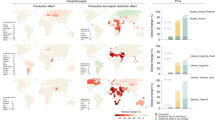Abstract
The Middle East and North Africa (MENA) Region is the largest grain importing region in the world. Severe constraints on arable land and water, coupled with a growing population and rising incomes, make the region inherently dependent on imports to meet rising demand for food, particularly cereals. These imports became exorbitantly expensive in recent years as world market prices for cereals were high and erratic. As a result, MENA countries, as well as food importing countries throughout the world, have placed a new premium on designing strategies for improving food security by reducing the risks that accompany being a food importing nation. This paper is meant to be an overview of strategies available to policy makers in the region in order to improve food security under the assumption of continued import dependence.







Similar content being viewed by others
Notes
Pure counterparty risk is normally a reference to actions or inactions of a counterparty based on volition. There is another side to performance risk and that is where the action or inactions of the counterparty is not due to their own volition, but due to the actions or inactions of a third party. For example—an export ban. The counterparty wants to perform but cannot due to the actions of a third party—in this case a government.
Examples include United States Department of Agriculture Foreign Agriculture Service, United Nations Food and Agriculture Organization, Chicago Mercantile Exchange, InterContinental Exchange, and Euronext Liffe.
References
Brennan, D. (2003). Price dynamics in the Bangladesh rice market: implications for public intervention. Agricultural Economics, 29, 15–25.
Dana, J., Gilbert, C. L., & Shim, E. (2006). Hedging grain price risk in the SADC: case studies of Malawi and Zambia. Food Policy, 31, 357–371.
DEFRA (Department for Environment, Food and Rural Affairs). (2008). Ensuring the UK’s food security in a changing world: a DEFRA discussion paper. London: DEFRA.
Dorosh, P. A. (2009). Price stabilization, international trade and national cereal stocks: world price shocks and policy response in South Asia. Food Security, 1, 137–149.
Guled, A. (2009). Somalis hijack grain ship, take Spaniards hostage. Reuters. http://www.reuters.com/article/idUSTRE5A43J220091105. Accessed 14 August 2010.
Karam, S. (2008). Saudi eyes food investments overseas, stockpiles. Arabianbusiness.com. http://www.arabianbusiness.com/518499-saudi-eyes-food-investments-overseas-stockpiles. Accessed 14 August 2010.
Kawach, N. (2010). Arab states’ food gap soars above $155 billion in nine years. Emirates Business. http://farmlandgrab.org/10390. Accessed 14 August 2010.
Larson, D. F. (1993). Policies for coping with price uncertainty for Mexican wheat. World Bank Policy Research Working Paper, 1120.
Mitchell, D. (2008). A note on rising food prices. World Bank Policy Research Working Paper, 4682.
Philp, C. (2008). Hong Kong grain ship seized as Somali pirates hold world to ransom. Times online. http://www.timesonline.co.uk/tol/news/world/africa/article5183710.ece. Accessed 14 August 2010.
Reuters (2003). Indian traders fear Iraq war will hit wheat deals. Rediff.com. http://www.rediff.com/money/2003/mar/20war5.htm. Accessed 14 August 2010.
Sheales, T. C., & Tomek, W. G. (1987). Hedging Australian wheat exports using futures markets. Journal of Futures Markets, 7(5), 519–533.
Simhan, T. E. Raja (2003). Fallout on shipping routes, costs. The Hindu Business Line. http://www.blonnet.com/2003/03/24/stories/2003032400250600.htm. Accessed 14 August 2010.
World Bank. (2009). Improving food security in Arab countries. Joint report with FAO and IFAD. Washington: World Bank.
Wright, B. (2009). International grain reserves and other instruments to address volatility in grain markets. World Bank Policy Research Working Paper, 5028.
Author information
Authors and Affiliations
Corresponding author
Rights and permissions
About this article
Cite this article
Sadler, M., Magnan, N. Grain import dependency in the MENA region: risk management options. Food Sec. 3 (Suppl 1), 77–89 (2011). https://doi.org/10.1007/s12571-010-0095-y
Received:
Accepted:
Published:
Issue Date:
DOI: https://doi.org/10.1007/s12571-010-0095-y




